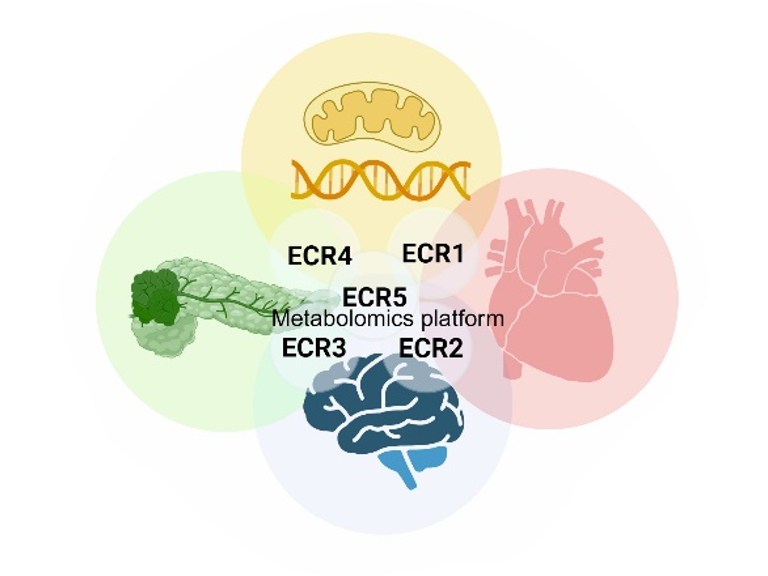UMG 2032 – Excellence through Focus
Early Career Researchers (ECR) leading Junior Research Groups
Through its 'UMG 2032 - Excellence through Focus' program, the University Medical Center Göttingen provides talented young scientists with attractive research conditions: scientific independence, competitive facilities, and excellent networking opportunities.
As a main measure of ‘UMG 2032 - Excellence through Focus’ we invite five applications as
Early Career Researchers (ECR)
to establish and lead a
Junior Research Group in the field of Metabolic Plasticity
The program targets postdoctoral researchers with an outstanding track record in the research fields mentioned below who see this position as an opportunity to pursue their scientific career. As leaders of one of the five advertised Junior Research Groups, they have the opportunity to conduct their own research projects and establish themselves in their respective fields.
Researchers from anywhere in the world who completed their doctorate no more than six years ago are eligible to apply. The eligibility window can be extended beyond 6 years for periods of parental leave or caring responsibilities.
The 5-year funding package includes:
Group leader position, team positions (a postdoc (1.0 FTE), a PhD student (0.65 FTE for 3 years), a technical assistant (0.5 FTE)), consumables and infrastructure.
The researchers funded in this program are brought together for networking and training events in the Göttingen Campus network.
ECR1: 'Mitochondrial Homeostasis'
The research program of ECR1 should provide a molecular research focus and will be dedicated to supporting a new research initiative focused on mitochondrial molecular biology, ideally with a link to CRC 1565. At the same time, it could connect with cardiac and oncological research to provide molecular insights into pathologic processes connected to the central role of mitochondria in cellular metabolism.
ECR2: 'Inter-organ communication'
Information exchange among organs and tissues is crucial for dynamically maintaining whole-body homeostasis. ECR2 should connect to the Heart and BrainRTG 2824 and activities in the DZHK, along with follow-up initiatives. The group should bridge the research focuses of cardiac, neuroscience, and potentially cell biology to provide deeper insights into the information exchange between different organs, thereby improving the understanding of health and conditions such as cardiac arrhythmia and heart failure.
ECR3: 'Metabolic Neuroimmune Adaptations'
CNS damage – whether from inflammation, cancer, trauma, degeneration, or ischemia – triggers a local immune activation and a recruitment of peripheral immune cells. This immune response, along with resident cell behavior, necessitates metabolic adaptations that regulate CNS recovery or degeneration with consecutive disease progression. ECR3 should explore which and how these mechanisms either help tissues restore function or lead to irreversible scarring and permanent deficits. The ECR3 is expected to integrate into the Göttingen’s neuroscience research focus on neuroinflammation and synaptic and sensoric signal processing (SFB-TR 274, SFB 1286, SFB 1690).
ECR4: 'Transcription and metabolic plasticity'
The ECR4 should focus on signal- and transcription-induced metabolic plasticity in pancreatic cancer. In particular, the research group should address the mechanisms of nuclear-mitochondrial communication in pancreatic cancer cell adaptation, immune escape, and therapy resistance. ECR4 will integrate with current and future research consortia on altered genome dynamics and immune regulation in tumor resistance (CRU 5002; RTG 2978; RU 208, CRC 1565) and interconnect with the research focus on mitochondrial homeostasis and metabolic immune adaptation in cancer.
ECR5: 'Metabolomics platform, Advancing Techniques for Studying Metabolic Plasticity'
ECR5 is dedicated to developing a new technological metabolomics platform and to expand existing mass spectrometry capabilities to unify all research efforts within our thematic focus areas. The field of metabolomics has made significant advances, providing in-depth insights into metabolic pathways, disease mechanisms, and treatment effects. High-resolution mass spectrometry is pivotal in this progress due to its sensitivity, accuracy, and versatility.
At UMG, we have established technical platforms that facilitate both service provision and technological innovation, including the Next-Generation Sequencing Facility for Integrative Genomics (NIG) and a comprehensive proteomics core facility. ECR5 will leverage expertise in cellular bioenergetics at Göttingen Campus to gain detailed insights into cellular and systemic metabolism.
By integrating and expanding this expertise into a multi-omics approach, we aim to bridge various research domains and provide a holistic understanding of biological systems. This integration, supported by cutting-edge bioinformatics from CAIMed, will enhance our comprehension of cellular interactions and pave the way for advancements in personalized medicine.
ECR5 will engage with current technological innovations in spatial metabolomics, mass spectrometry imaging and single-cell metabolomic techniques. These approaches will enable analysis of metabolic heterogeneity, which is vital for all research initiatives at UMG.
In summary, enhancing expertise in metabolomics at UMG will significantly boost its capacity to investigate metabolic processes. The integration of these techniques with other omics disciplines and the development of novel analytical methods will advance the understanding of metabolic plasticity in health, disease, and potential therapeutic strategies.
Overview of ECR 1-5 bridging the UMG research profile-forming priority research areas Molecular Cell Biology, Neurosciences, Cardiovascular Medicine and Oncology:

You might also be interested in: